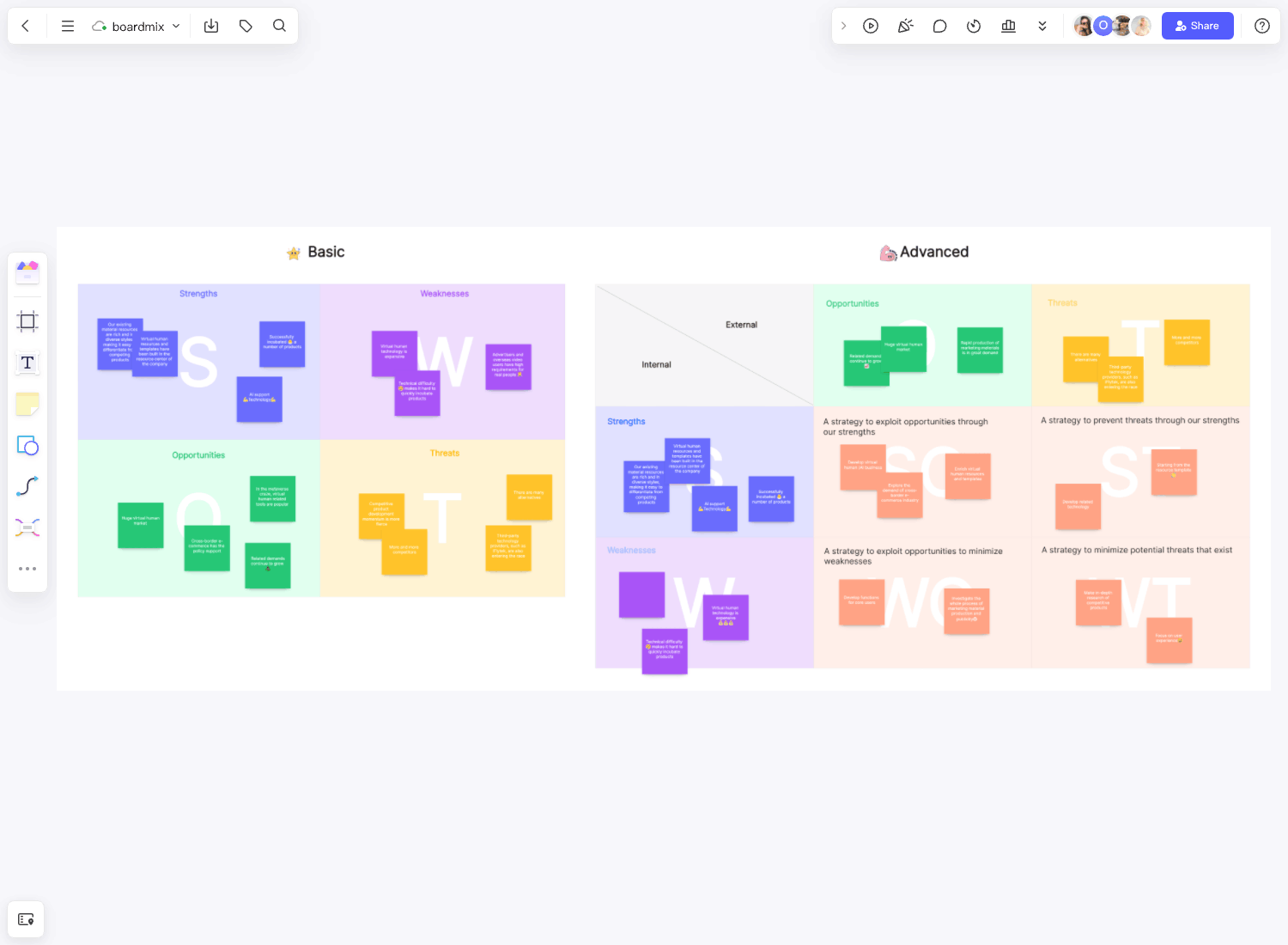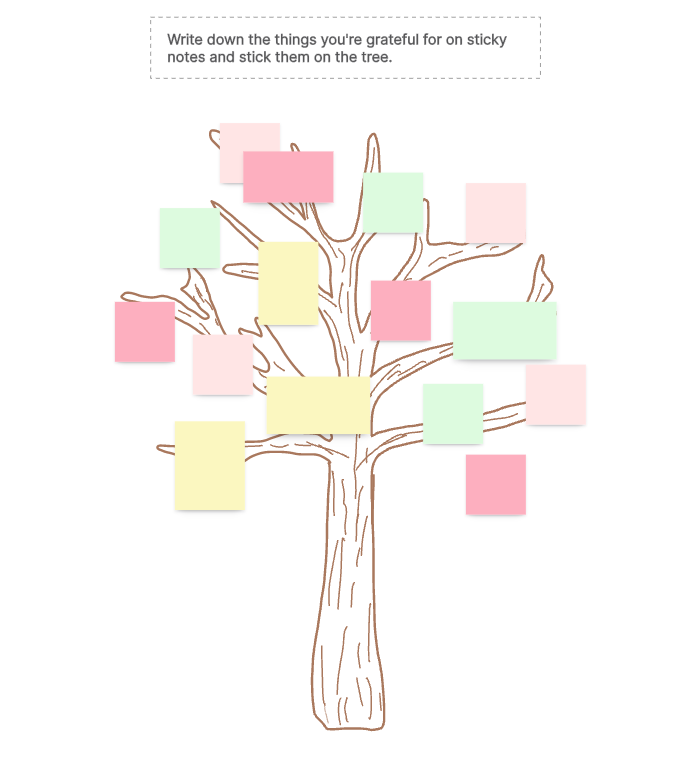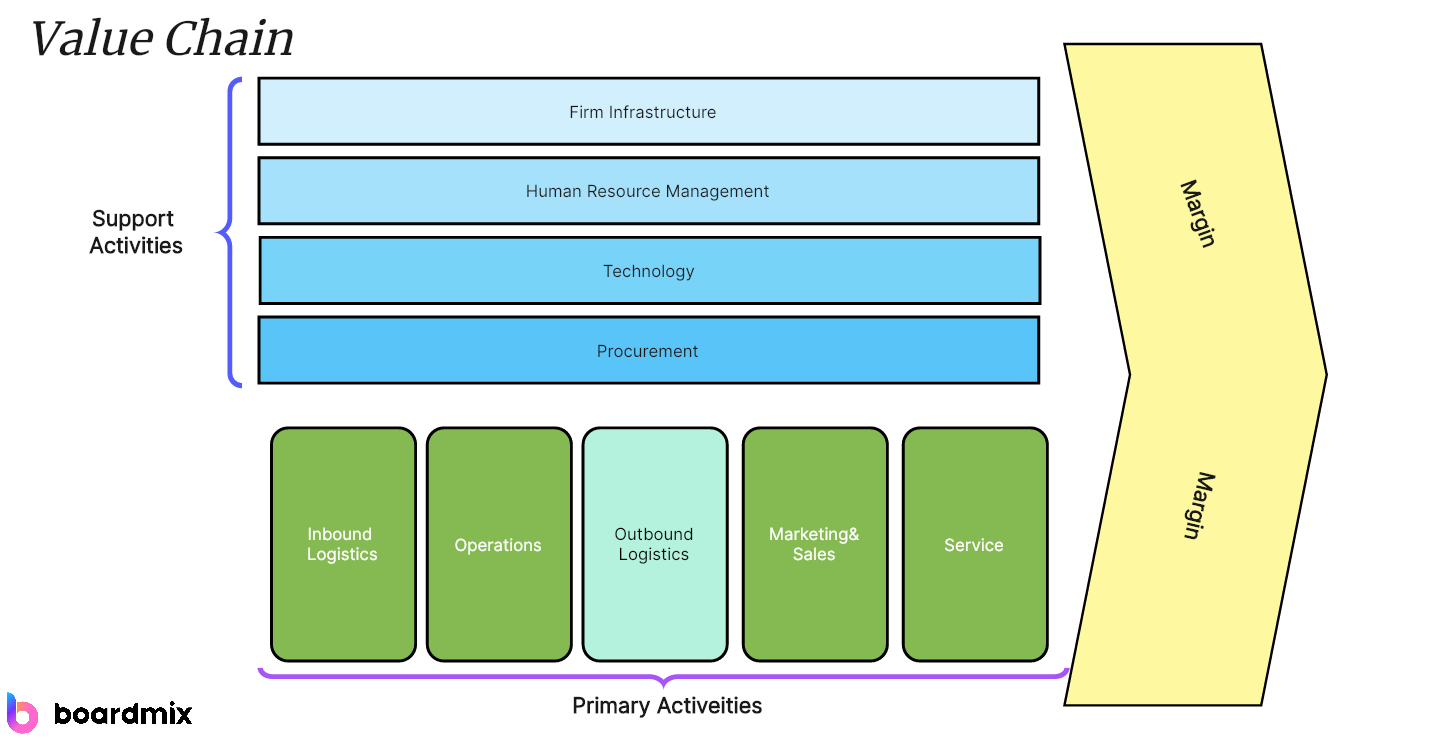Leveraging well-crafted templates to create an agenda can effectively address your team's needs. Utilizing these templates not only saves time during the planning phase but also enhances the overall effectiveness of meetings. Participants can better prepare for discussions, and the structured format promotes clear communication. So how can these resources guide you in cooking up your effective meeting agendas? Let's dive into these questions together, exploring the realm of meeting agenda examples and templates.

What is a meeting agenda and why it is important?
A meeting agenda is a document that outlines the topics and goals to be discussed during a meeting. It serves as a roadmap for the meeting, ensuring that all necessary points are addressed and allowing participants to come prepared. An agenda helps to keep the meeting focused and on track, maximizing productivity and minimizing wasted time. It also provides structure and clarity to the meeting, making it easier for participants to follow along and contribute. Overall, a meeting agenda is important because it helps to facilitate effective communication, decision-making, and collaboration among team members.
What are the key components of a meeting agenda?
A well-organized meeting agenda is crucial for ensuring that a gathering is productive and efficient. Several key components contribute to the success of a meeting agenda, each serving a specific purpose.
1. Purpose of the meeting
First and foremost, the purpose of the meeting should be clearly outlined. This is the overarching goal or objective that the participants should understand and work towards. Whether it's decision-making, brainstorming, or project updates, clarifying the purpose sets the tone for the entire meeting.
2. List of topics to be discussed
The second essential component is the list of topics to be discussed. This section breaks down the overarching purpose into actionable points, providing a roadmap for the meeting's progression. Each topic should be relevant to the overall purpose, ensuring that the discussion remains focused and goal-oriented.
3. Time allotted for each topic
Time management is another critical aspect. Allocating specific time slots for each agenda item helps maintain a structured and timely flow. This ensures that discussions do not linger unnecessarily, keeping the meeting on track and preventing it from running over the scheduled time.
4. Presenter for each topic
Identifying the presenter for each topic is the fourth key component. Assigning specific individuals to lead discussions not only ensures that the right expertise is brought to the table but also promotes accountability. Presenters should be well-prepared, knowledgeable about the topic, and capable of guiding the conversation to achieve the desired outcomes.
5. Action items
Finally, action items conclude the meeting agenda. These are specific tasks or follow-up actions that arise from the discussions during the meeting. Assigning responsibilities for these action items ensures that there is a clear path forward after the meeting concludes. This step is crucial for turning discussions into tangible results and maintaining momentum towards the overall meeting purpose.
In short, an effective meeting agenda comprises the purpose of the meeting, a list of relevant topics, allocated time for each item, designated presenters, and action items. Combining these components creates a structured framework that maximizes the productivity and success of the meeting, ultimately achieving the intended outcomes.

What are the types of meeting agendas?
There are several types of meeting agendas, each serving a specific purpose. Some common types include:
- Informational Agenda: This type of agenda is used for meetings where the main purpose is to share updates, reports, or information with attendees. It typically includes agenda items such as the presentation of data, project updates, or status reports.
- Decision-Making Agenda: This agenda is used when the meeting is focused on making decisions or reaching a consensus on specific topics or issues. It includes agenda items that require discussions, debates, and ultimately, a decision or resolution.
- Problem-Solving Agenda: This type of agenda is used for meetings that are centered around identifying and solving problems or challenges. It includes agenda items that involve analyzing issues, brainstorming solutions, and developing action plans.
- Action-Planning Agenda: This agenda is used when the main objective of the meeting is to plan and assign tasks or actions for future projects or initiatives. It includes agenda items that focus on setting goals, assigning responsibilities, and creating timelines.
- Review and Feedback Agenda: This type of agenda is used for meetings that involve reviewing progress, providing feedback, and discussing performance. It includes agenda items such as performance evaluations, project reviews, or feedback sessions.
- Team Building Agenda: This agenda is used for meetings that aim to enhance team cohesion, collaboration, and morale. It includes agenda items such as team-building activities, icebreaker exercises, or discussions on team dynamics.
Remember, the type of agenda you choose depends on the purpose and goals of the meeting. It's important to select the most appropriate type to ensure that the meeting achieves its intended outcomes.
How to create a meeting agenda?
To create a meeting agenda, follow these steps:
- Determine the purpose of the meeting: Before creating an agenda, it's important to clarify the objective of the meeting. This will help you identify the topics that need to be discussed and the goals that need to be achieved.
- Identify the main topics: Once you have a clear objective, make a list of the main topics that need to be addressed during the meeting. These topics should be relevant to the purpose of the meeting and contribute to achieving the desired outcomes.
- Break down each topic into subtopics: For each main topic, break it down into smaller subtopics or discussion points. This will help you organize the meeting agenda in a logical and structured manner.
- Allocate time for each topic: Estimate how much time should be allocated for each topic and subtopic. This will ensure that the meeting stays on track and that sufficient time is allocated for important discussions.
- Prioritize the topics: Arrange the topics in order of priority. Start with the most important and urgent topics, and then move on to less critical ones. This will help ensure that key issues are addressed first.
- Include additional agenda items: Apart from the main topics, consider including additional agenda items such as introductions, updates, and any other important information that needs to be shared with the participants.
- Include any necessary materials: If there are any materials or documents that participants need to review before the meeting, include them in the agenda. This will give participants enough time to prepare and come ready for discussion.
- Share the agenda in advance: Once you have finalized the meeting agenda, share it with all the participants well in advance. This will give them enough time to review the agenda and come prepared.
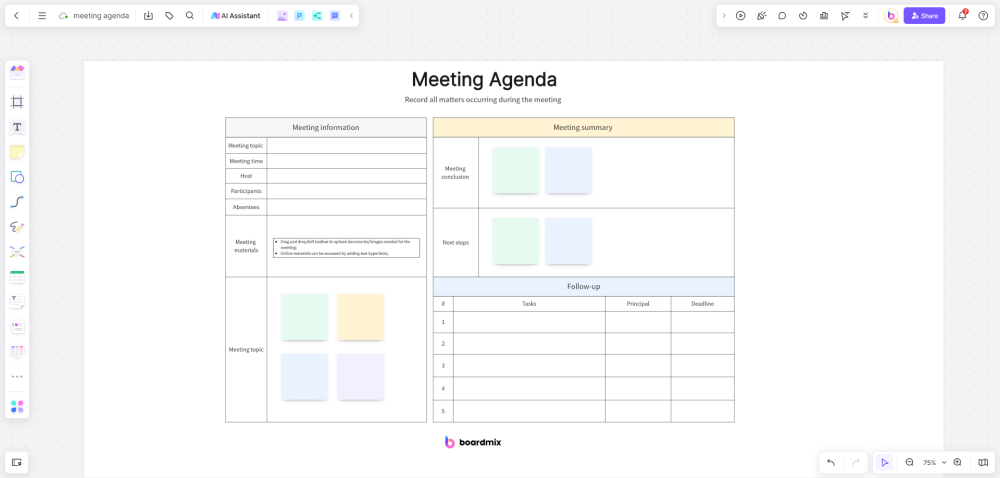
Remember, a well-crafted meeting agenda is essential for running an efficient and productive meeting. It helps set expectations, keeps discussions focused, and ensures that important topics are addressed.
Meeting Agenda Templates in Boardmix
When it comes to meeting agenda templates in Boardmix, there are several options to choose from. Meeting agenda templates serve as valuable tools in streamlining the planning process and ensuring consistency in various types of meetings. Here are a few templates that can help you create an effective meeting agenda.
Basic Meeting Agenda Template
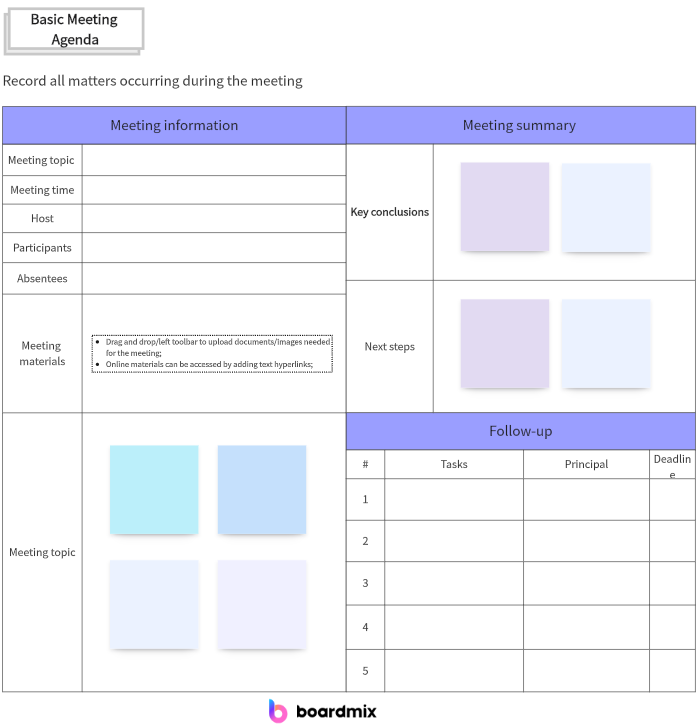
This template provides a simple format for organizing your meeting agenda. It includes sections for the meeting date, time, location, participants, and agenda items. You can customize the template by adding or removing sections as needed.
Team Meeting Agenda Template

This template is specifically designed for team meetings. It includes sections for reviewing action items from the previous meeting, discussing ongoing projects, and brainstorming new ideas. It also allows you to assign tasks and set deadlines for follow-up.
Project Meeting Agenda Template
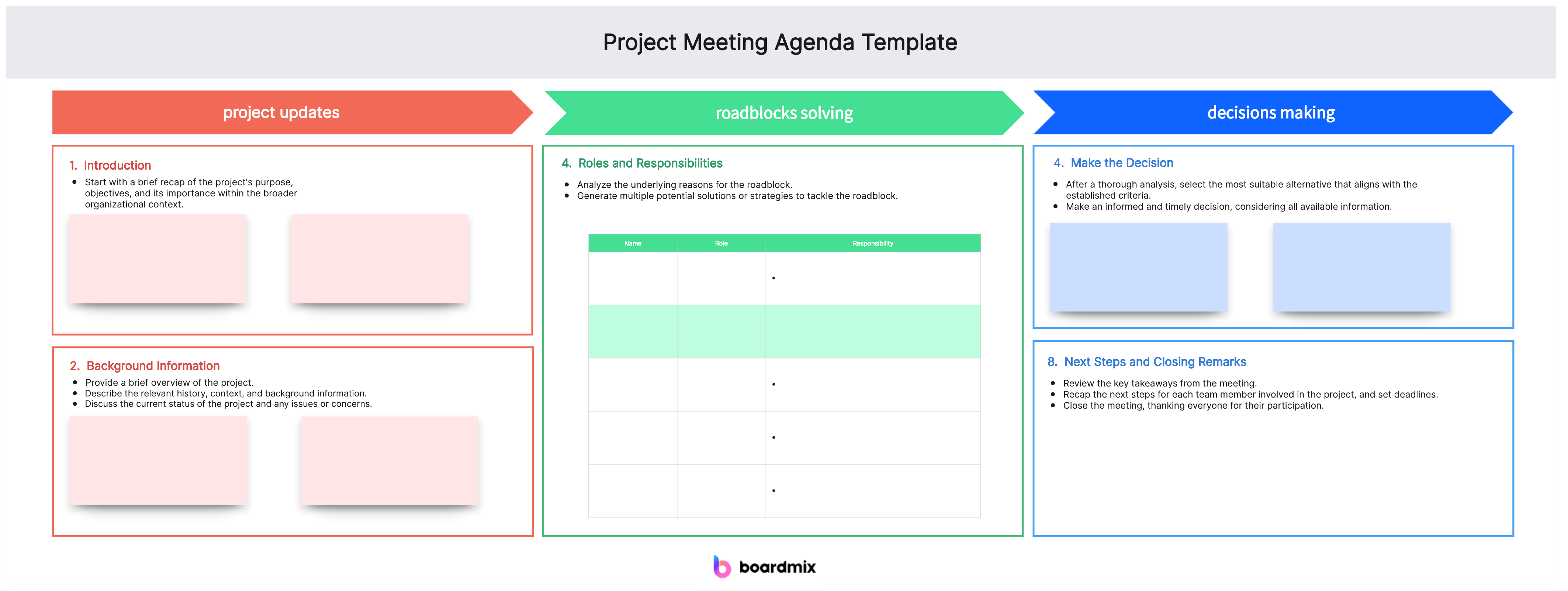
If you're conducting a meeting for a specific project, this template can be helpful. It includes sections for discussing project updates, addressing issues or roadblocks, and making decisions on next steps. You can also allocate time for individual team members to provide progress reports.
Sales Meeting Agenda Template
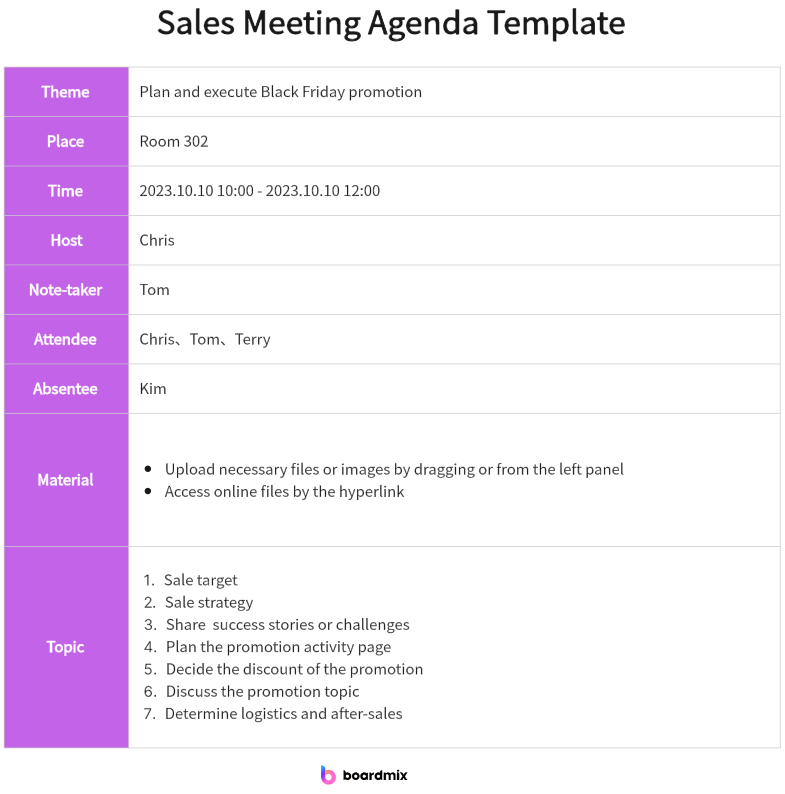
For sales teams, this template can help structure your sales meetings. It includes sections for reviewing sales targets, discussing sales strategies, and sharing success stories or challenges. You can also include time for training or product updates.
Board Meeting Agenda Template
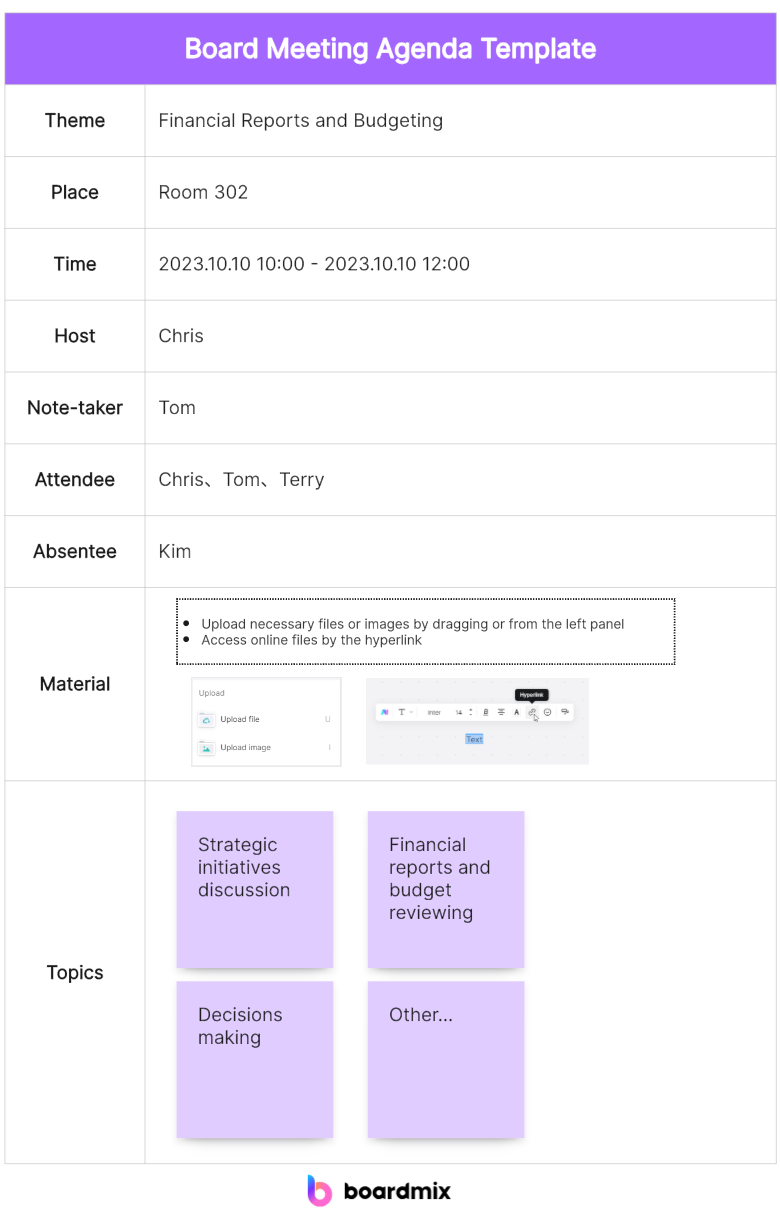
This template is ideal for board meetings. It includes sections for reviewing financial reports, discussing strategic initiatives, and making important decisions. You can also allocate time for guest presentations or reports from committee chairs.
These are just a few examples of the meeting agenda templates available in Boardmix. Depending on your specific needs, you can choose the template that best suits your meeting requirements. Remember to customize the template and include all relevant information to ensure a productive and well-organized meeting.
To Recap
In conclusion, recognizing the pivotal role of a well-structured meeting agenda is foundational to fostering productivity and engagement within teams. The Team Meeting Agenda, a critical organizational tool, becomes a guiding document that shapes the trajectory of discussions and outcomes.
As teams seek to optimize their meeting processes, Boardmix stands as a solution that transcends traditional approaches. With Meeting Agenda Templates tailored for team collaboration, Boardmix offers a user-friendly platform where teams can create, modify, and share agenda templates seamlessly. Accessing Meeting Agenda Templates in Boardmix ensures that teams have a ready-to-use, customizable resource at their fingertips.











